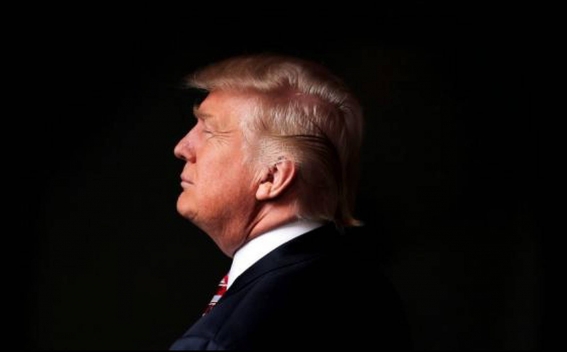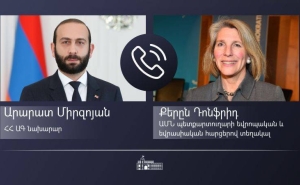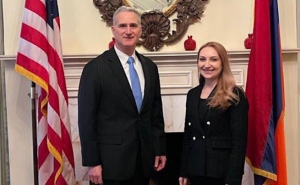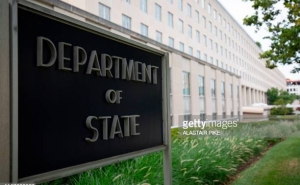 What Is Behind the US Twofold Stance on Qatar Crisis?
What Is Behind the US Twofold Stance on Qatar Crisis?

The US has recently been actively involved in the developments around the Qatar crisis. There are various interpretations of the US interests on the issue, as many times its stance seems to be quite contradictory.
When, for example, the US President Donald Trump takes a hard stance on the issue, particularly commenting that "the nation of Qatar has unfortunately been a funder of terrorism, and at a very high level, the time has come to call on Qatar to end its funding," as the Guardian reports, the US Secretary of State Rex Tillerson and Secretary of Defense Jim Mattis express a more softer stance. For example, Rex Tillerson called for lowering rhetoric and embarking on a dialogue, CNN reports. In addition he called on a Saudi Arabia-led coalition to ease its blockade of Qatar, saying that the cutoff is hindering the fight against Islamic State and provoking food shortages, Bloomberg reports.
The Pentagon, in its turn, after signing the warplane deal with Qatar, said that the jets sale would increase security cooperation between the US and Qatar. It should be noted that the agreement on the deal was reached back during the Obama administration; however, still if needed the US current administration could cancel the reached agreement.
What are the US possible interests in resolving the current crisis?
In this context, we should not forget that military cooperation between Qatar and the US goes back to 1991, Gulf War, where Qatar military forces acted as US allies. After which the US situated its prepositioned depots and the Al-Udeid Air Base in Qatar that further strengthened their military cooperation. The further tension of the Qatar crisis can make the US lose its military base there. which has a strategic meaning for the US in the region.
In addition, if the Qatar crisis further deepens, the US will be forced to choose between its allies in the region (such as Saudi Arabia and Qatar), which will weaken the US leverages in the region.
On the other hand, if the US deteriorates its relations with Qatar, it will bring Qatar closer to Iran, as isolated Qatar will depend more on the assistance from Iran. This in its turn will strengthen the leverages of Iran in the region, which cannot be in the interests of the US.
In addition it is said that there were times when Qatar acted as an interlocutor between America and different forces such as Taliban in Afghanistan. However, in this context it should also be noted that Qatar’s assumed connections with Hamas were also factors hindering the relations with the US, which largely supports Israel in the region.
So, if the further deepening of Qatar crisis is not largely in the interest of the US, how can one explain such a hard stance of the US President Donald Trump on the issue?
First, as a newly-elected US president, Trump needs to prove the world and his allies in the region that he is consistent in his policy in the fight against terrorism. Thus such a radical statement by Trump on the issue, which mostly contradicts his real actions, can largely be explained by Trump’s efforts to build appropriate PR for himself and his team.
Second, if in the long-term perspective, isolation and further deepening of Qatar are not largely in the interests of the US, in the short-term perspective, the US will be willing to shake its fist at Qatar for the latter to think twice when deepening its connections with the US rivals in the region, such as Iran.
Thus the US twofold role in the Qatar crisis is not by chance, because on the one hand the US needs to show its allies, who pose against Qatar, that the US is united with them in their struggle against terrorism, on the other hand in the long-term perspective it should do everything not lose one of his allies in the region - Qatar.
Other materials on this subject
- Turkey is sending Cold War-era cluster bombs to Ukraine – FP The weapons are designed to destroy tanks by bursting into smaller submunitions, which can linger on the battlefield for years if they do not immediately explode. Each round scatters about 88 bomblets.
- Los Angeles mayor and city council president address US president on Lachin corridor issue Thank you, Mayor Bass, for joining me in communicating to President Biden the urgent need for U.S. leadership to lift the blockade and bring humanitarian relief to the people of Artsakh.
- US Committed to Helping Armenia and Azerbaijan Resolve Issues Peacefully: Blinken Spoke With Pashinyan The Secretary reiterated our commitment to helping Armenia and Azerbaijan resolve issues peacefully.
- Iran to Submit Final Conclusion Over Nuclear Deal Revival by Midnight In comments on Monday, Amirabdollahian said Iran is going to send its final conclusion about the JCPOA talks to the European coordinator in written form at midnight.
- Erdogan, Biden Might Meet in September- Media Turkey plans to buy 40 F-16 fighter jets from the US and upgrade another eighty. US President Joe Biden stated that he expects to receive the approval of the [US] Congress to sell F-16 fighter jets to...
-
 17:08
17:08The regular session of the Anti-corruption Policy Council takes place in Jermuk
-
 15:05
15:05The Prime Minister sends congratulatory messages to the supreme leader of Iran and the President of Iran
-
 11:11
11:11Armenia sends earthquake aid to Turkey
-
 10:43
10:43Commemoration of the Pontiff St. Sahak Partev
-
 09:16
09:16Some roads are closed and difficult to pass in Armenia
-
 19:55
19:55Phone conversation of the Foreign Minister of Armenia with the U.S. Assistant Secretary of State for European and Eurasian Affairs
-
 18:30
18:30Prime Minister Pashinyan and President Khachaturyan meet
-
 18:20
18:20Ararat Mirzoyan with Co-Chairman of the OSCE Minsk Group of France Brice Roquefeuil
-
 17:01
17:01Humans could land on Mars within 10 years, Musk predicts
-
 16:45
16:45France, US urge 'immediate' end to Nagorno Karabakh blockade
-
 16:01
16:01Blockaded Nagorno Karabakh launches fundraiser to support quake-hit Syria
-
 15:59
15:59Earthquake death toll in Turkey rises to 18,342
-
 15:43
15:43Ararat Mirzoyan Held a Telephone Conversation with Sergey Lavrov
-
 15:06
15:06French president rules out fighter jet supplies to Ukraine in near future
-
 14:47
14:475 Day Weather Forecast in Armenia
-
 14:44
14:44President Vahagn Khachaturyan wrote a note in the book of condolences opened in the Embassy of Syria in Armenia
-
 14:20
14:20Azerbaijan’s provocations impede establishment of peace and stability – Armenian FM tells Russian Co-Chair of OSCE MG
-
 12:57
12:57France representation to OSCE: Paris calls on Azerbaijan to restore freedom of movement through Lachin corridor
-
 11:40
11:40Command of Kosovo forces highly appreciated preparation of Armenian peacekeepers
-
 10:16
10:16The United States withdrew from sanctions against Syria for six months the provision of assistance after the earthquake
day
week
month
Humidity: %
Wind: km/h









